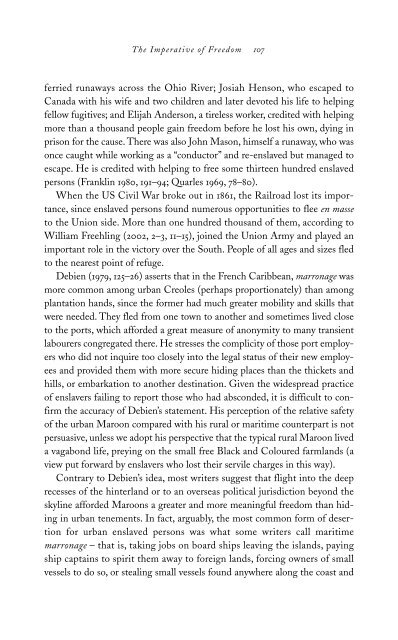60199616-flight-to-freedom-african-runaways-and-maroons-in-the-americas
60199616-flight-to-freedom-african-runaways-and-maroons-in-the-americas
60199616-flight-to-freedom-african-runaways-and-maroons-in-the-americas
Create successful ePaper yourself
Turn your PDF publications into a flip-book with our unique Google optimized e-Paper software.
The Imperative of Freedom<br />
107<br />
ferried <strong>runaways</strong> across <strong>the</strong> Ohio River; Josiah Henson, who escaped <strong>to</strong><br />
Canada with his wife <strong>and</strong> two children <strong>and</strong> later devoted his life <strong>to</strong> help<strong>in</strong>g<br />
fellow fugitives; <strong>and</strong> Elijah Anderson, a tireless worker, credited with help<strong>in</strong>g<br />
more than a thous<strong>and</strong> people ga<strong>in</strong> <strong>freedom</strong> before he lost his own, dy<strong>in</strong>g <strong>in</strong><br />
prison for <strong>the</strong> cause. There was also John Mason, himself a runaway, who was<br />
once caught while work<strong>in</strong>g as a “conduc<strong>to</strong>r” <strong>and</strong> re-enslaved but managed <strong>to</strong><br />
escape. He is credited with help<strong>in</strong>g <strong>to</strong> free some thirteen hundred enslaved<br />
persons (Frankl<strong>in</strong> 1980, 191–94; Quarles 1969, 78–80).<br />
When <strong>the</strong> US Civil War broke out <strong>in</strong> 1861, <strong>the</strong> Railroad lost its importance,<br />
s<strong>in</strong>ce enslaved persons found numerous opportunities <strong>to</strong> flee en masse<br />
<strong>to</strong> <strong>the</strong> Union side. More than one hundred thous<strong>and</strong> of <strong>the</strong>m, accord<strong>in</strong>g <strong>to</strong><br />
William Freehl<strong>in</strong>g (2002, 2–3, 11–15), jo<strong>in</strong>ed <strong>the</strong> Union Army <strong>and</strong> played an<br />
important role <strong>in</strong> <strong>the</strong> vic<strong>to</strong>ry over <strong>the</strong> South. People of all ages <strong>and</strong> sizes fled<br />
<strong>to</strong> <strong>the</strong> nearest po<strong>in</strong>t of refuge.<br />
Debien (1979, 125–26) asserts that <strong>in</strong> <strong>the</strong> French Caribbean, marronage was<br />
more common among urban Creoles (perhaps proportionately) than among<br />
plantation h<strong>and</strong>s, s<strong>in</strong>ce <strong>the</strong> former had much greater mobility <strong>and</strong> skills that<br />
were needed. They fled from one <strong>to</strong>wn <strong>to</strong> ano<strong>the</strong>r <strong>and</strong> sometimes lived close<br />
<strong>to</strong> <strong>the</strong> ports, which afforded a great measure of anonymity <strong>to</strong> many transient<br />
labourers congregated <strong>the</strong>re. He stresses <strong>the</strong> complicity of those port employers<br />
who did not <strong>in</strong>quire <strong>to</strong>o closely <strong>in</strong><strong>to</strong> <strong>the</strong> legal status of <strong>the</strong>ir new employees<br />
<strong>and</strong> provided <strong>the</strong>m with more secure hid<strong>in</strong>g places than <strong>the</strong> thickets <strong>and</strong><br />
hills, or embarkation <strong>to</strong> ano<strong>the</strong>r dest<strong>in</strong>ation. Given <strong>the</strong> widespread practice<br />
of enslavers fail<strong>in</strong>g <strong>to</strong> report those who had absconded, it is difficult <strong>to</strong> confirm<br />
<strong>the</strong> accuracy of Debien’s statement. His perception of <strong>the</strong> relative safety<br />
of <strong>the</strong> urban Maroon compared with his rural or maritime counterpart is not<br />
persuasive, unless we adopt his perspective that <strong>the</strong> typical rural Maroon lived<br />
a vagabond life, prey<strong>in</strong>g on <strong>the</strong> small free Black <strong>and</strong> Coloured farml<strong>and</strong>s (a<br />
view put forward by enslavers who lost <strong>the</strong>ir servile charges <strong>in</strong> this way).<br />
Contrary <strong>to</strong> Debien’s idea, most writers suggest that <strong>flight</strong> <strong>in</strong><strong>to</strong> <strong>the</strong> deep<br />
recesses of <strong>the</strong> h<strong>in</strong>terl<strong>and</strong> or <strong>to</strong> an overseas political jurisdiction beyond <strong>the</strong><br />
skyl<strong>in</strong>e afforded Maroons a greater <strong>and</strong> more mean<strong>in</strong>gful <strong>freedom</strong> than hid<strong>in</strong>g<br />
<strong>in</strong> urban tenements. In fact, arguably, <strong>the</strong> most common form of desertion<br />
for urban enslaved persons was what some writers call maritime<br />
marronage – that is, tak<strong>in</strong>g jobs on board ships leav<strong>in</strong>g <strong>the</strong> isl<strong>and</strong>s, pay<strong>in</strong>g<br />
ship capta<strong>in</strong>s <strong>to</strong> spirit <strong>the</strong>m away <strong>to</strong> foreign l<strong>and</strong>s, forc<strong>in</strong>g owners of small<br />
vessels <strong>to</strong> do so, or steal<strong>in</strong>g small vessels found anywhere along <strong>the</strong> coast <strong>and</strong>


